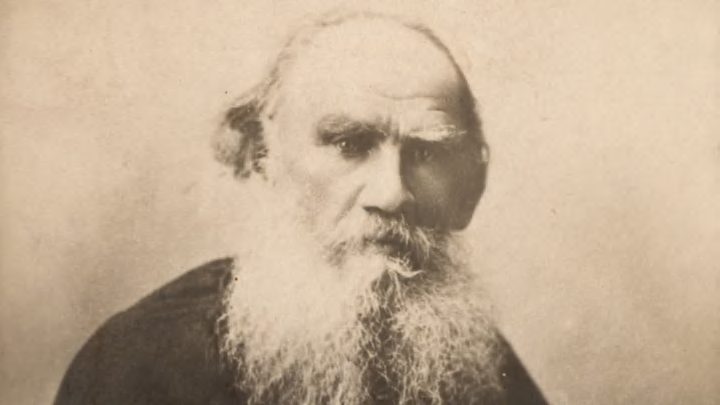AUTHORS (1828–1910); YASNAYA POLYANA, RUSSIA
When you think about the great works of Russian literature, chances are your mind immediately goes to author Leo Tolstoy. His novels War and Peace and Anna Karenina captivated readers when they debuted, and more than a century after their publications, they are still regarded as some of the best literary works ever put to paper. But book sales are only part of the story—find out more about the life and career of Leo Tolstoy.
1. Leo Tolstoy didn’t love War and Peace.

Writing War and Peace was a grueling process for Leo Tolstoy. He was constantly revising the work, with the opening scene alone taking him 15 drafts and roughly one year to get just right. Ultimately, all his hard work paid off. War and Peace is arguably his most famous work, as well as one of the most celebrated novels ever written. But despite spending so much time with it (or perhaps because of that fact), Tolstoy grew disdainful of the book.
In a letter to a friend, he shared that he thought the story was bloated, and in his diary, he wrote, “People love me for the trifles—War and Peace and so on—that they think are so important.”
2. Leo Tolstoy's Anna Karenina was inspired by true events.

The events of Anna Karenina may have been lifted from a real-life drama afflicting Leo Tolstoy’s friend and neighbor Aleksandr Nikolaevich Bibikov, who was romantically involved with a woman named Anna Stepanovna Pirogova. But Bibikov started neglecting her in favor of his children’s German governess. Overcome with jealousy, Stepanovna fled to the countryside where she wandered grief-stricken for a few days before stepping in front of a train and died by suicide. Tolstoy was a witness at her autopsy, and the episode affected him enough that, a year later, he decided to turn it into a novel.
3. Leo Tolstoy's wife Sophia was an invaluable asset to his career.

Many great artists benefited from the invisible labor of their partners, but the support Leo Tolstoy got from his wife was especially apparent. Per his wishes, Sophia (or Sofya) sat with him while he wrote, and she'd often provide edits and suggestions. She was the one who rewrote all his drafts so he would have a legible manuscript to send to publishers—which must have been quite challenging considering Tolstoy’s high page counts. On the business side, Sophia was the one who urged him to publish War and Peace as a full novel instead of just serialized stories.
4. Leo Tolstoy and Sophia had 13 children.

With his wife, Sophia, Leo Tolstoy had 13 children—eight of whom survived to adulthood. Some took after their father by growing up to be writers, including Ilya Lvovich Tolstoy and Lev Lvovich Tolstoy. Hundreds of his direct descendants are alive today, and biannual Tolstoy family reunions are held at his estate (now a museum) in Yasnaya Polyana, Russia.
5. Leo Tolstoy is one of the best-selling authors of all time.

It’s hard to come up with exact sales numbers for books published prior to the 20th century, but it’s safe to say that Tolstoy’s books are perennial bestsellers. In 2004 alone, Anna Karenina got a boost from Oprah Winfrey’s Book Club, with its publisher increasing that year’s print run from 20,000 to 800,000 copies. War and Peace also sold enough copies to make the UK Bookseller's top 50 list in 2016 when it was adapted for BBC. According to some estimates, more than 400 million copies of Tolstoy’s works have been sold.
6. Leo Tolstoy never won a Nobel Prize.

When the Nobel Prize for Literature debuted in 1901, many people assumed Leo Tolstoy would be the winner. In what’s still considered one of the biggest snubs in the award’s history, he was passed over in favor of French poet Sully Prudhomme. Forty-two Swedish writers and artists wrote Tolstoy to express their disagreement with the Nobel Prize committee, to which he responded, “I was very happy to know the Nobel Prize was not awarded to me. It deprived me of a big problem of how to use the money.” He was nominated each subsequent year until 1906.
Memorable Leo Tolstoy Quotes
- “If there existed no external means for dimming their consciences, one-half of the men would at once shoot themselves, because to live contrary to one's reason is a most intolerable state, and all men of our time are in such a state.”
- “Faith is the sense of life, that sense by virtue of which man does not destroy himself, but continues to live on. It is the force whereby we live.”
- “The changes in our life must come from the impossibility to live otherwise than according to the demands of our conscience not from our mental resolution to try a new form of life.”
- “In all history there is no war which was not hatched by the governments, the governments alone, independent of the interests of the people, to whom war is always pernicious even when successful.”
